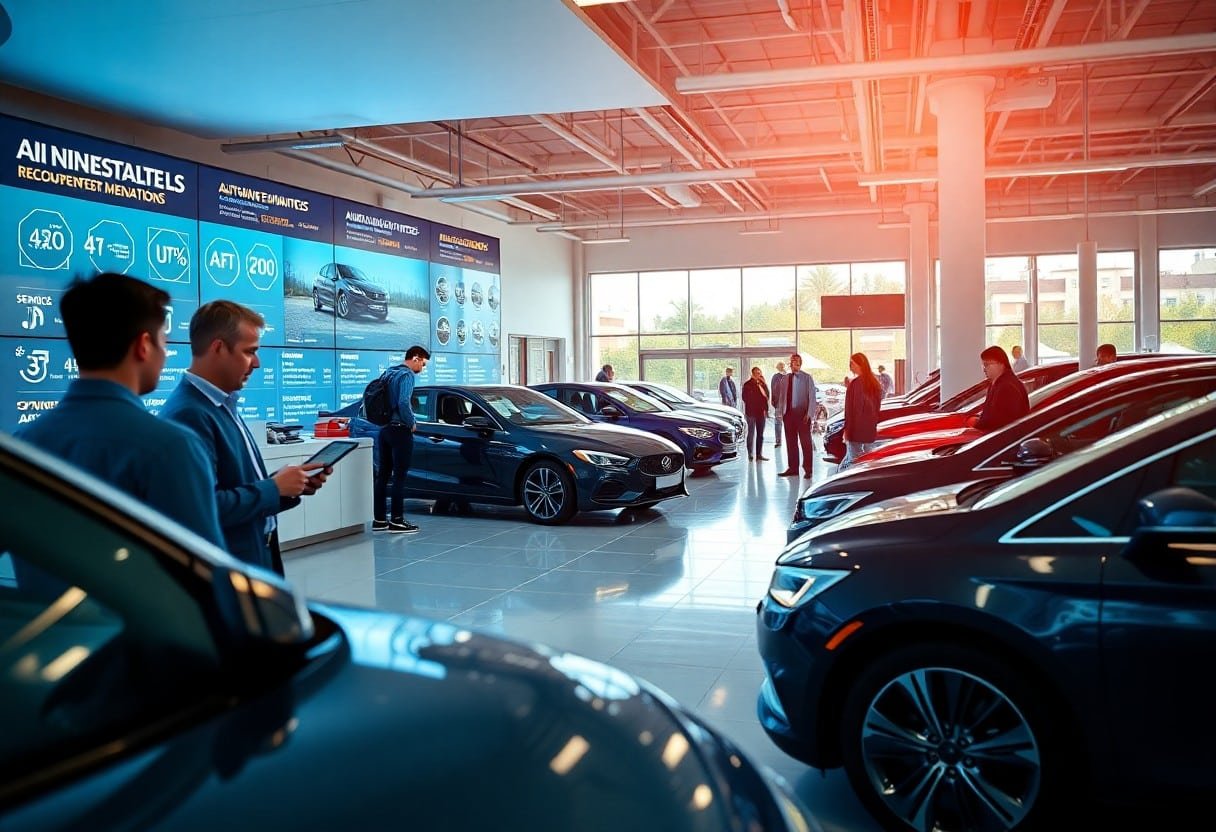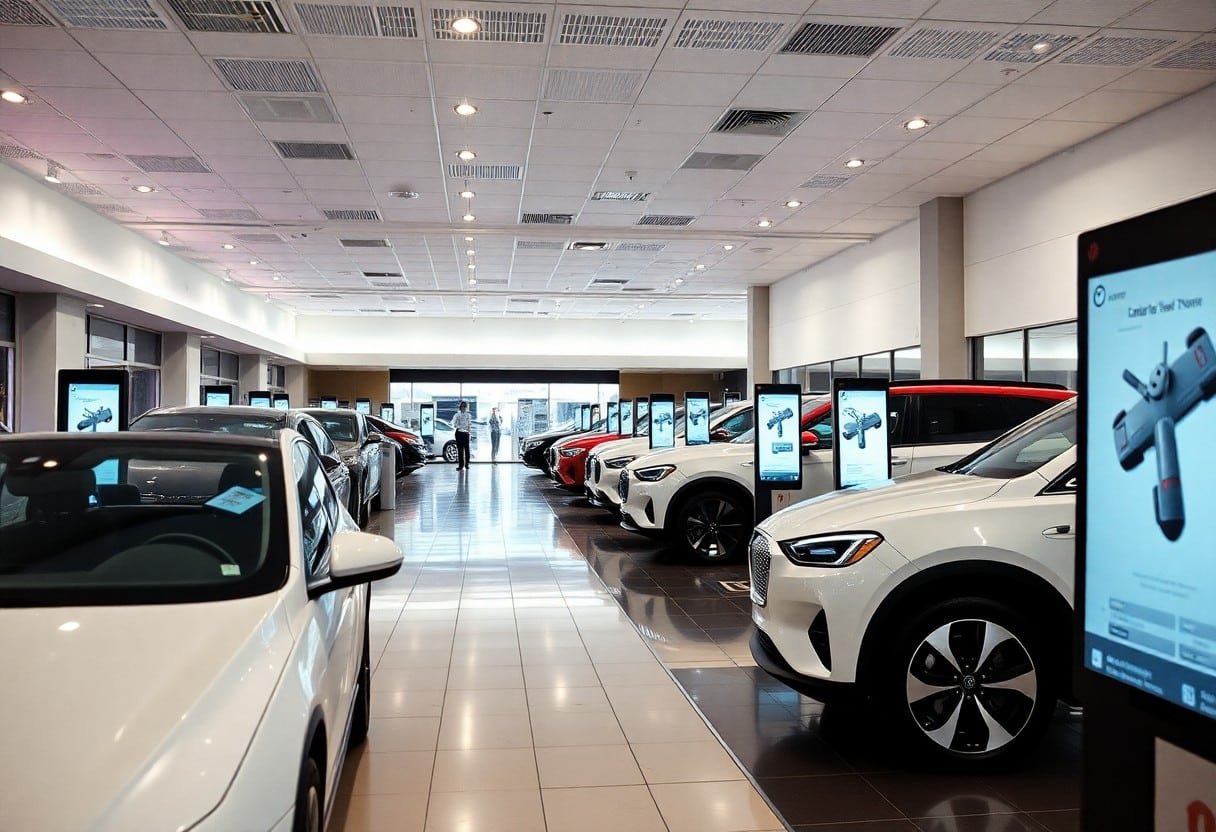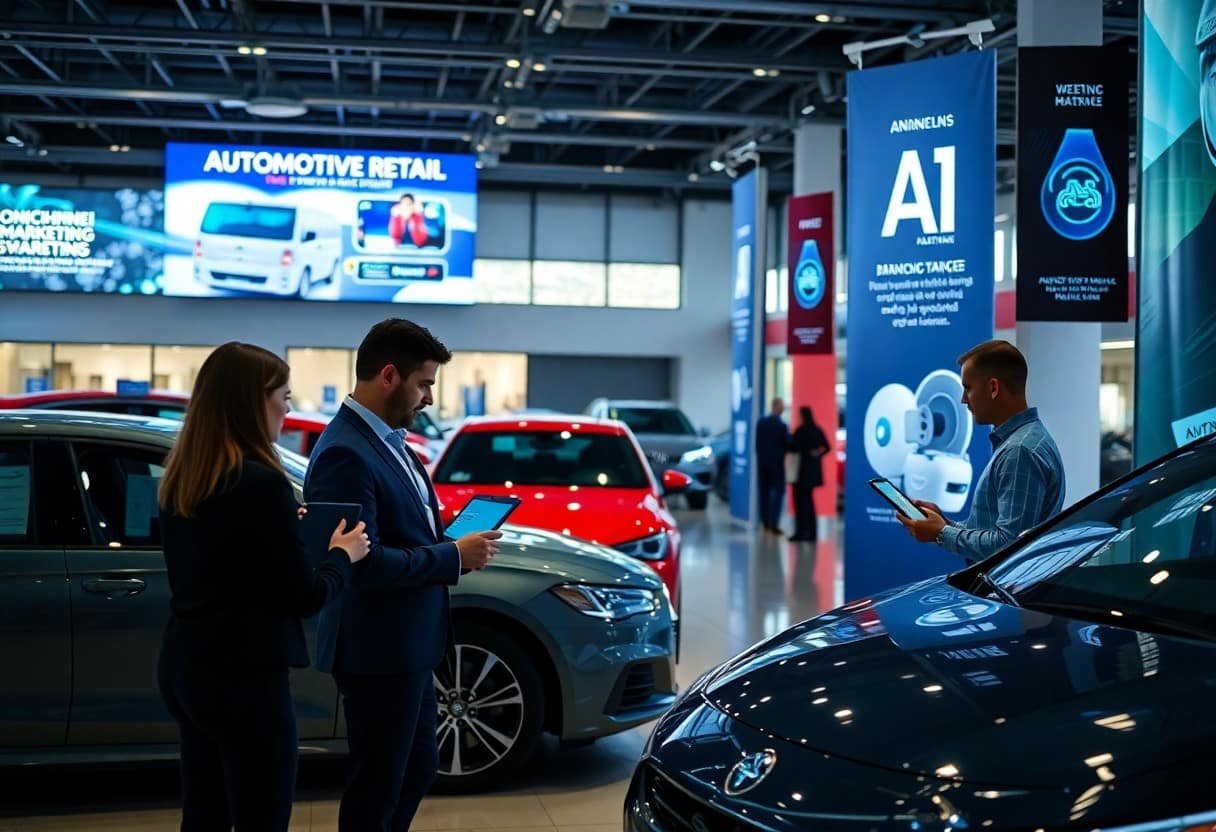Over recent years, the integration of artificial intelligence in automotive retail has transformed how dealerships engage with customers across multiple channels. By leveraging AI-driven omnichannel marketing strategies, you can enhance customer experiences, streamline operations, and ultimately drive sales. Understanding and implementing these strategies will enable your dealership to connect with potential buyers more effectively, ensuring that your marketing efforts are both cohesive and impactful in today’s competitive landscape.
Key Takeaways:
- Implementing personalized marketing strategies enhances customer engagement and boosts sales.
- Integrating online and offline channels creates a seamless customer experience, improving satisfaction.
- Utilizing data analytics to track customer behavior allows for targeted promotions and improved inventory management.
Understanding the Role of AI in Automotive Retail
AI fundamentally transforms the automotive retail landscape by enabling data-driven decision-making, enhancing personalization, and optimizing operational efficiency. Through sophisticated algorithms and machine learning, AI analyzes consumer behavior and market trends, allowing dealerships to tailor their offerings and streamline interactions. The implementation of AI creates a seamless experience that aligns with customer expectations, paving the way for more effective sales strategies.
Enhancing Customer Experience
AI drives personalized customer experiences by analyzing preferences and behaviors, allowing you to create tailored marketing messages and recommendations. Utilizing chatbots and virtual assistants, customer inquiries are answered instantly, fostering a more engaging interaction with your dealership. Enhanced features, like 360-degree vehicle views and virtual test drives, elevate the shopping experience, making it easier for customers to find exactly what they want.
Streamlining Operations
AI streamlines dealership operations by automating routine tasks and improving inventory management. Predictive analytics enables you to optimize stock levels based on consumer demand, reducing overstock and enhancing cash flow. Additionally, AI can automate appointment scheduling and service reminders, increasing operational efficiency and allowing your staff to focus on higher-value tasks.
Adopting AI for operational streamlining means significantly reducing time spent on administrative tasks. For example, predictive maintenance tools harness AI algorithms to analyze vehicle data, alerting you to potential issues before they occur. This proactive approach not only minimizes repair costs but also enhances customer satisfaction by ensuring vehicles are in peak condition. With AI-driven insights, you can adjust staffing and inventory in real time, responding effectively to customer demands and market shifts, ultimately driving profitability and reducing waste.
Omnichannel Marketing Strategies
Creating a cohesive omnichannel strategy is vital for dealerships aiming to enhance customer experiences and maximize sales. By combining digital and physical touchpoints, you can ensure your customers receive a seamless journey. Explore AI in Automotive Retail: 7 Omnichannel Tactics for actionable insights.
Integrating Online and Offline Channels
Aligning your online presence with in-store experiences significantly impacts customer satisfaction. Use consistent messaging, branding, and promotions across platforms to create an integrated approach. For instance, encourage your digital leads to visit the showroom with exclusive in-store offers that they can redeem through your website.
Leveraging Data-Driven Insights
Utilizing data analytics allows you to refine your marketing strategies and target customers more effectively. By analyzing customer behavior, preferences, and buying patterns, you can create customized marketing campaigns that resonate with your audience.
Data insights can drive decisions in real-time, such as optimizing inventory based on demand forecasts or adjusting promotional efforts on specific models. For example, dealerships leveraging AI-driven platforms can assess online browsing history coupled with purchase data to identify ideal customer segments, enabling tailored outreach that boosts conversion rates. Adjusting your online ads and email marketing based on these insights ensures your communications are not only relevant but also timely, maximizing engagement and sales efficacy.
Personalized Customer Engagement
Personalized customer engagement leverages AI to create tailored experiences that resonate with individual preferences and behaviors. By understanding your customers’ unique journeys, you can offer relevant recommendations and communications that foster loyalty. Techniques such as predictive analytics can anticipate needs, enhancing the customer experience. For more insights, check out A people-first playbook: Putting AI to work in your dealership.
Targeted Advertising Techniques
Utilizing targeted advertising techniques enables you to focus your marketing efforts on specific demographics and behavioral segments. AI can analyze data from various channels to identify potential buyers, ensuring that your ads are displayed to the most relevant audiences, resulting in higher conversion rates and return on investment.
Tailored Communication Strategies
Implementing tailored communication strategies allows you to connect with customers on a personal level. AI-driven tools can segment your audience based on preferences and past interactions, enabling you to send highly customized messages and offers. This approach not only enhances engagement but also increases the likelihood of sales by addressing the specific needs of your customers.
For effective tailored communication, utilize automated email campaigns that trigger based on user behavior. For instance, if a customer browses specific vehicle models on your website, you can send targeted follow-up emails featuring special promotions or information about those models. This level of personalization boosts engagement and drives conversions, as prospective buyers feel valued and understood in their unique automotive journey. Incorporating chatbots can further enhance communication by providing instant support and tailored experiences, ensuring you remain responsive to customer inquiries and interests.

The Impact of AI-Driven Recommendations
AI-driven recommendations transform the automotive retail landscape by personalizing the customer journey. By analyzing customer data, preferences, and buying behaviors, dealerships can offer tailored vehicle suggestions that align with the specific needs of each potential buyer. This level of personalization not only increases engagement but also enhances conversion rates, as customers are more likely to find vehicles that resonate with their unique choices and lifestyles.
Intelligent Inventory Management
Intelligent inventory management utilizes AI algorithms to optimize stock levels based on real-time market demand and customer preferences. By predicting which vehicles will sell and adjusting inventory accordingly, you can minimize overstock and reduce carrying costs. This efficiency leads to better cash flow and enhanced customer satisfaction, as you’re more likely to have the right vehicles available when customers want them.
Predictive Analytics for Sales
Predictive analytics in sales empowers dealerships by forecasting potential customer behaviors and market trends. By leveraging historical data and machine learning models, you can identify which leads are most likely to convert into sales, enabling your sales team to focus their efforts more effectively. This approach enhances target accuracy and increases the volume of successful transactions.
Predictive analytics offers insights by analyzing patterns in customer interactions, demographics, and purchasing history. For instance, a dealership could use AI to determine that families with specific income levels prefer SUVs. By targeting these demographics with personalized marketing efforts, you’re more likely to meet their expectations and increase sales. Moreover, real-time data allows you to adjust campaigns based on immediate feedback, leading to faster and more informed decision-making in your sales strategy.

Overcoming Challenges in Implementation
Implementing AI-driven solutions in automotive retail presents several challenges that dealerships must navigate effectively. From ensuring seamless integration with existing systems to equipping your staff with the necessary technical skills, each hurdle requires strategic planning and execution. A comprehensive approach, as outlined in How AI is Changing the Automotive Retail Industry, can greatly enhance your dealership’s operational efficiency.
Integration with Existing Systems
Integrating AI technologies with your current management systems is often challenging due to varying compatibility and legacy systems. Streamlining data flow and ensuring that your CRM, inventory, and sales platforms communicate effectively will maximize AI’s potential and minimize disruptions.
Training Staff on New Technologies
Training your staff on new technologies is imperative for successful implementation. Without adequate knowledge and confidence in using AI tools, your team may struggle to leverage these innovations to their full advantage, hindering dealership performance.
Investing in comprehensive training programs can make a significant difference in staff adaptation to AI technologies. Tailored training sessions that focus on practical applications of AI in sales processes, customer relationship management, and inventory handling will empower your employees. Regular hands-on workshops, combined with ongoing support from AI vendors, can foster a culture of continuous learning, helping your team feel more comfortable and competent in utilizing these advanced tools, ultimately boosting productivity and customer satisfaction.

Future Trends in Automotive Retail
The automotive retail landscape is evolving swiftly, influenced by advancements in technology and shifting consumer preferences. Dealerships will need to adapt by leveraging innovative tools, focusing on personalized experiences, and embracing new business models that align with modern buying habits. As AI technologies advance, the integration of smart solutions will reshape customer interactions, driving efficiency and enhancing satisfaction across all channels.
The Evolution of AI Technologies
AI technologies are progressing rapidly, moving from basic automation to sophisticated machine learning systems that can analyze vast data sets in real-time. This evolution allows you to gain deeper insights into consumer behavior, optimizing inventory management and enhancing customer service. More dealerships are deploying these advanced AI systems, enabling predictive analytics that forecast sales trends and streamline operations with greater accuracy.
The Shift Towards Sustainability
Sustainability is becoming a primary focus for both consumers and businesses in the automotive sector. You need to recognize the growing demand for eco-friendly practices, as buyers increasingly favor brands that prioritize environmental responsibility. Dealerships are now integrating sustainable initiatives into their operations, from adopting electric vehicles to implementing energy-efficient technologies in their facilities.
This shift is evident as consumers are willing to pay a premium for sustainable options; a recent study found that 75% of car buyers express interest in electric or hybrid vehicles. By aligning your dealership with environmentally friendly practices, you not only attract a broader customer base but also enhance your brand reputation. Leveraging AI to optimize operations can help reduce waste and emissions, further solidifying your commitment to sustainability while driving profitability in the process.
Summing up
As a reminder, leveraging AI in automotive retail through omnichannel marketing strategies significantly enhances your dealership’s success. By integrating data-driven insights across various channels, you can provide a seamless customer experience, driving engagement and sales. Emphasizing personalization and consistency in your messaging ensures that you meet your customers where they are. Adopting these strategies not only positions your dealership competitively but also fosters long-term relationships with your clientele. Focus on implementing these technologies to optimize your marketing efforts for maximum impact.



